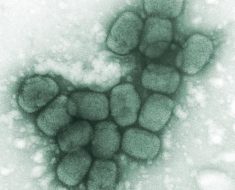Iron contained within peas could be processed to provide more effective dietary supplements, according to a new study by scientists at the University of East Anglia.
Supplements are taken by people with low iron levels to prevent fatigue, shortness of breath or dizziness, but are also poorly absorbed by the body. Because they contain quite high doses of iron, this can lead to side effects such as stomach pain or constipation.
Many plants naturally contain rich sources of iron, but as they pass through the stomach the iron is released from the food as it is being digested and then bound by different compounds in the gut, preventing it being absorbed.
The research team wanted to find out if there was a way in which iron, taken from peas in the form of a protein called ferritin, could be absorbed more effectively.
The ferritin was extracted and purified using methods designed at the John Innes Centre, in Norwich, and the UEA team tested it in cells designed to mimic the human gut.
The cells were treated with the ferritin protein previously exposed to acid conditions – similar to those found in the stomach – and then again under pH conditions closer to neutral – comparable to the body’s small intestine.
The results, published in the Journal of Nutrition, showed that when the ferritin was exposed to acid conditions, it breaks down and the iron is released. It then behaves like other plant-derived iron with only small amounts being absorbed.
If the ferritin is introduced to the cells under neutral pH conditions, however, it remains intact and can be absorbed by cells in the gut in a process called endocytosis.
Dr. Ildefonso Rodriguez Ramiro, from UEA’s Norwich Medical School, said: “These results show that the iron from ferritin could be absorbed by the small intestine by an alternative mechanism to plant-derived iron, if the stomach acid pH is avoided. This means that, in the right conditions, the ferritin could be a very effective dietary supplement.”
In order to work, the ferritin would need to be protected as it passes through the stomach into the intestine, where it can be absorbed.
Prof Susan Fairweather-Tait, from UEA’s Norwich Medical School, said: “Technology already exists that would enable us to produce coated capsules that could effectively transport the ferritin through the stomach and into the intestine where it can be absorbed.”
Explaining why peas were selected for this research, Janneke Balk, of the John Innes Centre, said: “Peas are rich in ferritin, more so than other pulses. As a crop, peas do not need fertilizer and are often used in crop rotations to bring natural nitrogen fertilizer into the ground. After extracting the ferritin, the starch and protein can be used in other food products.”
The team is currently searching for collaborators to help them take the research forward.
Source: Read Full Article





